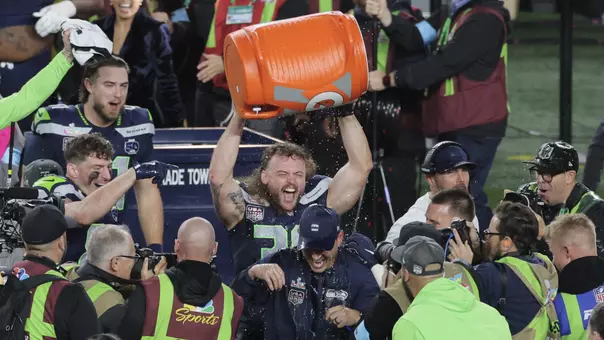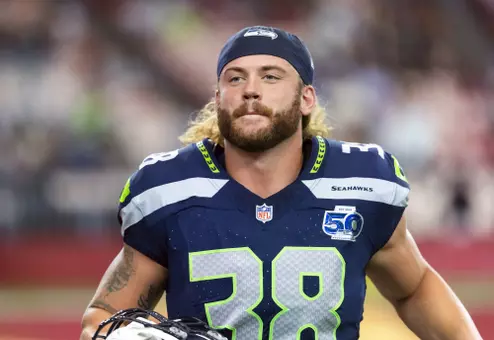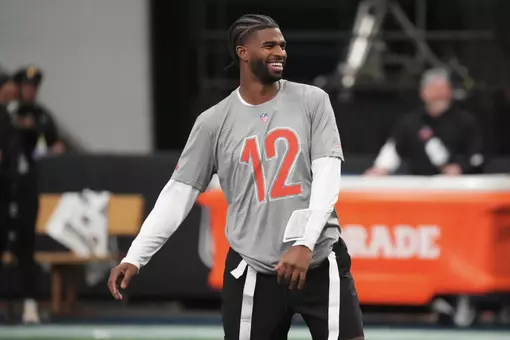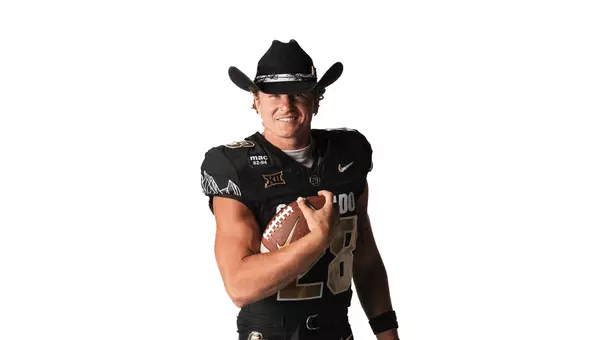Colorado University Athletics

Buffs Helping Buffs: The Gift Of Life
October 05, 2017 | Football, Buff Club, Neill Woelk
This is a story about generosity, a story about love, compassion, friendship and a community. It is a story about what kind of impact one selfless decision by one person can have on the lives of others; and a story about happenstance, circumstance and coincidence.
But most of all, it is a story about how all those things came together to produce what everyone involved insists is a miracle.
It is hard to argue with their conclusion.

after the transplant surgery
BOULDER — Lee Snyder still remembers driving home from some errands one day last May after his wife, Char, had been released from the hospital.
"We get home on Friday and I'm out running errands on Saturday morning and I'm driving around town," Lee said recently. "I'm coming home and I have to stop. I realize that I've never been happier in my life. Never. … It's just the happiest I've ever been."
It is not difficult to understand such an epiphany.
Just a few days earlier, Char Snyder had undergone a kidney transplant, thanks to an organ donation from Teri Trafton. The entire procedure had gone perfectly and both women had been discharged from the University of Colorado Medical Center on the Anschutz Medical Campus with excellent prognoses. (Four months later, both are still doing extremely well.)
Thus the reason for the celebration. It is a story with a happy ending.
But what is not so easy to pinpoint is the beginning of the story, the exact moment that led to the transplant.
Where to start?
It could be the day last fall when Charlie and Teri Trafton arrived at a CU football game and noticed that Char wasn't at the game. The Traftons knew Char had been sick and needed a kidney donor — but the last they had heard, a donor had been found and the transplant was on schedule.
They didn't know the possible donor had turned out to be incompatible and that Char's situation had made the turn from serious to dire.
Charlie Trafton: "We knew Char had been gone the previous year but we expected to see her because we had heard she had a kidney donated. When we didn't see her, Teri asked Lee, 'Where's Char?' Lee told her she was still looking for a donor. Teri was broken hearted. Driving home that night, she said to me, 'I'm giving Char a kidney.'
"I said, 'That's great, but this is a big deal. You really need to think about this. Can we at least take a couple days to think about it?' She just said, 'I'm doing it.'"
That, evidently, is the way Teri Trafton works. See the problem, diagnose the solution — and then make it happen.
Teri Trafton: "I could see the look in Lee's eyes. It was beyond the words coming out of his mouth. He just had those tears in his eyes. You could tell he was so worried about Char. It bothered me the whole game. I couldn't stop seeing Lee, and the fear and concern on his face. … We knew we had to do it."
But actually, not even that point is the beginning of the story.

For years, the Traftons and Snyders, both Buffs season ticket holders and CU Athletic Department donors, knew each other only because they sat in the same section in Folsom Field — and even that was coincidence.
Ten years ago, the Traftons decided to move their seats from the Flatirons Club on the west side of Folsom Field to the Stadium Club seating on the east side. Only through a pure stroke of luck did the Traftons end up just one row in front of the Snyders — but still, the couples were little more than acquaintances, seeing each other only five or six times a year at home football games.
The Traftons lived in Seattle. The Snyders lived in Boulder. The Traftons traveled to Boulder for CU home games, but the two couples were not, by any true definition, close friends.
They were, however, Buffs fans — and that move from the west side to the east side, the move that put the Traftons one row in front of the Snyders, produced a relationship that would literally save a life.
Teri Trafton: "I guess you could say the whole thing came about because of CU football. The thing is, we're not just fair-weather fans. … We cheered together, we laughed together, we celebrated together, sometimes we mourned together and — I must admit — we have even jeered a time or two together. … But there's more to CU football than just what happens on the field. The players are young men finding their way in the world and we like to help them. It's about giving to them, giving to the people around you, giving to the CU community — and it really is a community. You have a common interest and you are all in it together."

More coincidence and circumstance? Figure this: the Traftons moved back to Colorado from Seattle in the summer of 2016. Had they not made the move, had they not lived in the area, the entire process of a kidney donation would have been incredibly difficult.
But they did move their seats a decade ago. They did move back from Seattle. They did strike up a relationship with the Snyders, and they did learn of Char's situation.
And one week after Lee told them why Char still wasn't able to attend football games, Teri told Lee what she wanted to do.
Lee Snyder: "That next game, Teri turns around to me and says, 'Lee, I'd like to donate a kidney to Char.' And I'm thinking, 'Oh, that's big.' I heard every word. We're watching the game and I'm thinking 'OK.' But I don't know what to say next."
So they continued to watch the game. But as the game went on — as the Buffs were winning — Lee couldn't take his mind off what Teri had said.
Lee Snyder: "Late in the game, I have to follow up. I say to Teri, 'You mentioned early in the game that you wish to donate a kidney to Char. This is serious.' I'm pretty emotionally wound up at this point, but she just looks at me with this smile and says, 'Yes, Lee. Email me all the contact information for Anschutz and I'll follow up Monday.' And she did it. It was off and running right then. I get chills right now just talking about it."
Of course, there were no guarantees that Teri would prove to be a compatible donor. Up to that point, the Snyders had seen their hopes buoyed 11 times by possible donors, only to see each of them ultimately prove to be incompatible.
Lee Snyder: "We had all kinds of people say they would donate a kidney. The postman told us he was going to donate a kidney …"
Teri Trafton: "Hey — I delivered."
Indeed — but not before a long process, one that almost came to an end without Teri being approved.
After the Folsom Field discussion, Teri did indeed make contact with the people at the Anschutz Medical Campus and begin the process. She drove back and forth from Colorado Springs for several months, meeting with doctors, undergoing tests and participating in all the other steps necessary to see if she would be a compatible donor.
But at one point, she hit what looked to be an insurmountable snag.
Teri Trafton: "My first appointment with Anschutz was Oct. 12. Around December they did a test and they said they were going to disqualify me. In fact, they said, 'Not only are you disqualified, you need to see a nephrologist. You have some issues.' I had to tell Char I had been thrown out of the program — and at that point, she didn't care about herself, she was worried about me. She called her nephrologist to talk to them to see if I could see them. She was more worried about me at that point than she was about herself."
But Teri, not one to easily give up, met with her doctor. They conducted more tests and determined that she was "absolutely perfect."
That led to another call and another visit to Anschutz. Her message was simple.
Teri Trafton: "I don't take 'no' for an answer. It was, 'Put me back in coach, I'm ready to go.' So off we went again."
Throughout the process, the Traftons kept Char and Lee posted on the progress. They heard when Teri couldn't make it to Denver one winter morning because Interstate 25 was closed — but then found out she left several hours later when the highway reopened. She drove through the snow to keep her appointment, then drove to the airport to pick up Charlie, who had been out of town on business.
Every step of the way, Teri kept them informed, and with each report (after the early complication), the Snyders became more and more optimistic.
Char Snyder: "She was amazing. She never quit. I think the whole process took six months, counting time out. Teri had to go back and forth and Charlie was with her every time. She went through something like 12 procedures. They try to find something wrong with you, which you learn to really appreciate, because they want everything to be perfect. The people at Anschutz are just amazing … If she had anything important to tell us, she would always call. She just gave us so much positive energy."
But even with the positive energy, time was running out on Char, who was undergoing regular dialysis at that point. Teri Trafton, it became clear, was about to become Char Snyder's last hope.
Char was originally diagnosed with kidney disease in November 2015. An annual physical revealed that her one functioning kidney was in Stage 5 of failure — critical. One month later she was told by doctors that her situation would require a transplant, and the time frame was short.
The Snyders immediately began researching the donor process, but the prospects weren't good. Unless someone they knew stepped forward, Char's best bet was getting on a waiting list and likely getting a kidney from a cadaver, something that might take as long as three or four years.
But the rapid advance of her disease didn't allow for that much time. Tests that measured her kidney function continued to show poorer and poorer results.
One doctor even told Char that her situation had reached the point that she could simply go to sleep one night and not wake up.
Char Snyder: "I never thought I was going to die. … I always thought, 'I'm going to wake up for Lee.'"
Still, despite all the optimism possible, the Snyders were beginning to wonder what would happen if they could not find a donor. As gently as they could, their doctors began to warn them that time was running short.
Then came the 2016 football season, "The Rise." And the Snyders found out that the answer to their problem had been sitting in front of them for the last 10 years of Buffs football games.
Char Snyder: "We had gone through 11 (possible donor) procedures and none of them worked out."
Charlie Trafton: "And all you had to do was tap the lady's shoulder in front of you at the football game."
Char Snyder: "The moral is you never know who's sitting in front of you at a football game … they could save your life."
Teri Trafton: "Or change your life."
It is worth noting here that transplant surgery — for the donor and recipient — is an invasive, complicated procedure, with a recovery time that can stretch into months. The surgery can have a debilitating effect on even the healthiest of people.

Thus, the question is obvious: what prompted Teri Trafton to be that person willing to become a donor? What compels someone to step up and volunteer to donate a body part to someone she knows only because they sit close to each other at Colorado football games?
Teri Trafton: "There are two questions people always ask me. One is how how well did you know her and why did you do it? My answer to that is twofold: the first part is as Christians, I absolutely believe the Bible teaches that you need to love one another, you need to love your neighbor. The Bible goes on to say you should lay down your life for your brother. I believe that.
"The second part is in that in this day and age, we need more love. We need people to care about something other than just themselves or their little bubble. The world is big and it needs a lot and it needs to start with love. We talked about it, we prayed about it and asked ourselves, 'Is this something that we want to do?' I just figured if it wasn't the right thing to do, I would be disqualified somewhere along the line, so off I went. I never thought anything of it.
"The second question people ask me is, 'The rest of your life, what do you need to do?' That's really easy, too. Nothing that any of us wouldn't do. Make sure I drink water. Make sure I stay a healthy weight. And I can't take anything but Tylenol. Other than that, it's easy."
Still, the Traftons did their homework before going through with the donation. Charlie admits he was more worried than Teri, from the beginning right up to the end.
Early in the process, they met with one of the surgeons involved in the procedure, Dr. Thomas Bak. Teri asked Bak if he would allow his wife to donate a kidney. Bak told the Traftons that his wife had donated half of her liver to her mother, and they could talk with her if they thought it would help in the decision-making process.
Teri Trafton: "She came in and we chatted and she was wonderful. She said she still runs 3 miles every morning. And I thought, 'Well maybe if I get rid of my kidney, I'll start wanting to run 3 miles every morning.' She was really great. I never really thought twice about any of it again … But I'm still waiting for the 3-mile run to kick in."
On May 23, 2017, the two were admitted to the Anschutz Medical Center in Denver. Dr. Peter Kennealey and Dr. Bak performed the surgeries, removing one of Teri Trafton's healthy kidneys and transplanting it to Char Snyder.
Char Snyder: "It's been fantastic ever since. I was in the hospital three nights. Teri came in after two nights to say goodbye. After three nights we were released. They asked, 'Do you want a wheelchair?' and I said, 'No, I'm going to walk out.' So I walked out."

Since the surgery, both couples have had time to think about the circumstances that led to the transplant. They have mused over the timing and the fact that everything came together because of their love of the Buffs. They have marveled at the coincidences that occurred — from the Traftons' decision to move their seats at Folsom, to the luck that put them one row in front of the Snyders, to their decision to move back to Colorado just months before Char Snyder's situation became dire. And, of course, the ultimate stroke of luck: the fact that Teri Trafton's kidney was a perfect match for Char Snyder.
But most of all, they have become acutely aware of what the act of helping a friend can really mean.
Lee Snyder: "It does change your perception of what generosity is and what you think donating and giving really is. You think you are doing that, and then you run into a situation where someone actually donates a body part to your loving spouse … it blows you away. There's so much more stuff that we can do to donate and help other people. Something like this does affect you. You never forget about it. It just shows you what's possible and what's meaningful."
Teri Trafton: "That's my point. What is possible — if we all do it, it's possible. We can do this."
Char Snyder: "I prayed to God that somebody would be able to give me a kidney. I said 'God, I'm asking you for a kidney.' I had seen a program on TV where one of the people said, 'If you are really in need, ask God for it.' I didn't want to ask God — I didn't want to bother him. But I asked. … There are just a lot of miracle parts to this story. Now I believe in miracles. I believe in everything. I believe in love."
Teri Trafton: "It is a miracle. No doubt. The whole CU experience … I think it is a miracle that is not of this world."


with Dr. Peter Kennealey.
The happy ending to this story — the successful transplant and the good health of Char Snyder and Teri Trafton — is actually not the end.
Rather, it has proven to be the beginning of yet another chapter, that of paying it forward.
Approximately four months after Char was released from the hospital, the Snyders established the "Trafton-Snyder Endowed Fund in Kidney Transplantation." The fund will provide support for the Division of Transplant Surgery at the University of Colorado Anschutz, helping to provide flexible resources for kidney transplantation and end-stage renal disease care initiatives.
Lee Snyder: "We want to honor Teri for what she did. … It is something we'll be working with for the rest of our lives. We have to put something back. This is something we feel very strongly about."
Charlie Trafton: "We have to mention how great Anschutz is. I've never felt so comfortable at a hospital my entire life. I wasn't a patient, but it was amazing. I told someone there they were the Nordstrom of hospitals. That's what it felt like. They were outstanding in every regard."
The first fund manager will be Dr. Kennealey.
Kennealey is currently the Surgical Director of Kidney and Transplantation at Anschutz, as well as the Director of the Vascular Access Surgery Program at Anschutz. The Trafton-Snyder Fund, he said, will help Anschutz provide much-needed help to people in underserved areas.
"A big problem in healthcare today is a lack of access to quality care, especially for people who live in rural or other underserved areas," Kennealey said. "Through the endowment, we're going to be able to reach out and further establish our outreach in more of these areas."
Anschutz is currently one of the top centers in the nation for living donor transplant programs. Kennealey wants more people to have access to those programs by making it easier and more comfortable for them to initiate the process.
"Take, for example, the person who is in rural Colorado," Kennealey said. "One, they're saying kidney disease is terrifying. Two, transplantation is something they can't wrap their head around, and three, they don't want to drive to Denver. These feelings create barriers to healthcare."
But, Kennealey said, if the University of Colorado Hospital can establish more outreach in underserved areas, it can make people much more comfortable with the process.
"To combat those frightening things, we go there," he said. "Now they don't have to drive anywhere. They go to where they normally see their doctors. We can talk to them about transplantation and we can break it down into things they can understand and relate to. We take this extremely complicated thing and break down those barriers in just one discussion.
"Then they realize, 'These people aren't scary. It's just not something I've thought about before.' Their entire comfort level with what was a frightening process changes dramatically."
Kennealey is — obviously — well-versed in the ravages of kidney disease. Statistics, he said, are grim: the end-life mortality on dialysis patients is 20 percent per year, with only 1/3 of patients surviving five years.
But he also knows that early care can improve odds.
"If I can facilitate people getting comprehensive care in a timely way and make their access to transplantation better, then that's what I want to do."
The Trafton-Snyder Fund will help Kennealey pursue that goal.
Char Snyder: "Everyone was just terrific throughout this whole process. Dr. Kennealey was wonderful. Anschutz was amazing. CU has been fantastic. All the love that has been shown to us has been incredible. All 300 Buffalo Belles want to know how I'm doing. The higher-ups — the president, the chancellor, (athletic director) Rick George have all been fantastic. It's been amazing."

Late in September, the Traftons and Snyders sat in the CU Champions Center for this interview, in a room overlooking Folsom Field. Char is once again attending football games, and the Snyders and Traftons are once again cheering together.
The setting and circumstances did not go unnoticed as they talked about their journey.
Lee Snyder: "It's a wonderful story how this all came about — and it came about because of this football stadium. That was the genesis of this whole thing. You see CU in a whole different viewpoint. It was a big part of our lives before — but now it takes on kind of a bigger role, all for the right reasons."
Teri Trafton: "Honestly? We love the Buffs, and Buffs help Buffs. That's all there is to it."
That — and maybe a miracle or two for good measure.
Contact: Neill.Woelk@Colorado.edu






